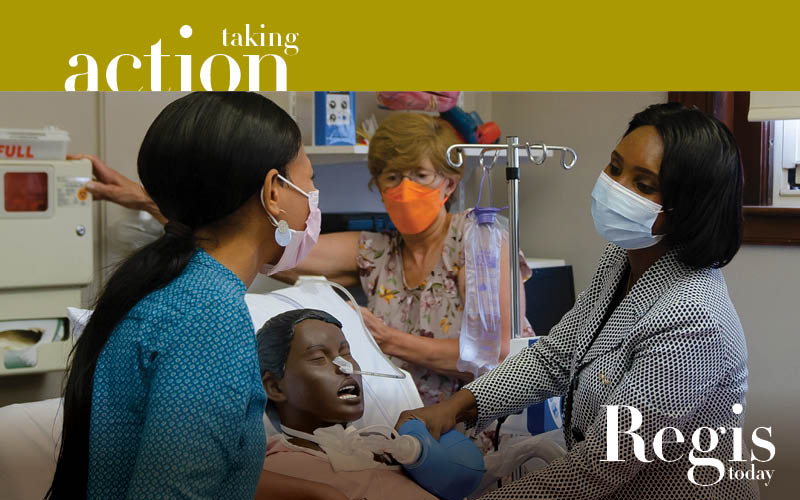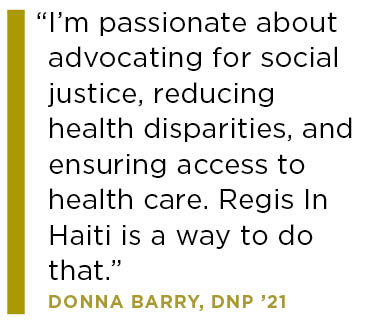
Global Preparation
STORY KRISTEN WALSH
PHOTO BY MICHAEL BURCHFIEL
In July 2022, a group of nine nursing faculty from Haiti traveled to the Regis campus for a two-week, intensive educational program as part of the Regis In Haiti program. The coursework focused on how to incorporate the use of simulation into their teaching practices at Haiti’s state-run nursing schools and teaching hospitals.
“Haiti’s top-tier nursing schools do a great job at didactic and exam preparation, but there is a need for hands-on development of clinical skills,” says Donna Barry, DNP ’21, who was leading the program as Regis’ director of global nursing and is now program director of the Doctorate of Nursing Practice (DNP) on-campus program. “Our goal is to guide them on how to integrate more simulation curriculum into their nursing schools so their students are better prepared once they graduate and get out into the field.”
The Regis In Haiti simulation course will help address health disparities in Haiti, a nation with short- and long-term health problems, which is experiencing devastating political turmoil. The country also has an acute shortage of nurses and nurse educators.
Knowledge Sharing
Two retired Regis faculty members, Janis Tuxbury, MSN ’99, DNP ’11, RN, and Patricia McCauley, DNP ’15, RN, CHSE, taught the visiting faculty.
“The curriculum was framed to cover the International Nursing Association of Clinical and Simulation Learning nine health care simulation standards of best practice that will provide a solid background of what they want to accomplish at their respective nursing schools,” Tuxbury says. “Being aware of discrepancies and inequalities in nursing education in Haiti will be a tool for them to speak up for their profession.”
McCauley adds, “This knowledge allows them to advocate for resources to improve the education of future nurses as well as those nurses in practice settings.”
Most mornings were spent in structured class teaching about the standard for that day, with afternoons in the lab working with related equipment. In the Regis computer lab, the Haitian faculty designed their own simulation scenarios—on topics of their choice, including postpartum hemorrhage and asthma. The final two days of the two-week intensive simulation program culminated in each learner piloting their individual scenario with their peers, taking on the patient or family role as standardized patients.
A key takeaway was how faculty interact with students for debriefing, particularly emphasizing patience, positive reinforcement, and communication.
“The first thing I have learned is to be more patient and to be working at a slower pace with the students,” says Cherubin Sony Joseph, professor of human anatomy and physiology at the School of Nursing Our Lady of Wisdom in Cap-Haïtien, Haiti. “I usually cover a lot of things with my students, so I see going slower is a way for my students to be able to understand beyond what I am teaching them. It’s like my creativity grew during the [Regis] classes and during the teaching.”
But they weren’t the only ones learning. McCauley and Tuxbury were impressed by the way that the visiting faculty members’ simulation presentations included different levels of students teaching each other.
“A first-year student would open the gauze packages and place them for the second-year student to prepare; and the third-year student would take off the old dressing and assess it,” Tuxbury says. “That kind of collaboration was really interesting.”
McCauley and Tuxbury have been part of Regis In Haiti for more than a decade.
“If we know something, we want to share it with everybody, that’s our mantra,” McCauley says of their inspiration. “It stems from us personally, but I also think that as a profession we have a responsibility to provide up-to-date, evidence-based nursing education to our colleagues, wherever they may be.”
Passionate Partnership
Regis In Haiti began as the Regis College Haiti Project in 2007 with a collaboration between university nursing faculty and the Haitian Ministry of Health to educate nurse leaders and educators so they can better prepare the next generation of providers. Since the start of the program, 37 core nursing faculty and clinical practitioners working in both Haitian public and private nursing schools have graduated with a master’s degree through Regis.
In 2019 Regis was awarded a grant from the Wagner Foundation to fund the Regis In Haiti program, making it possible for Regis and the Ministry of Health to work with partners on the ground including Health Equity International/St. Boniface Hospital and Partners In Health/Zanmi Lasante/ Hopital Universitaire de Mirebalais on initiatives that strengthen the nursing profession—including the current on-campus simulation course.
In 2023, the Wagner Foundation awarded an additional $820,000 to Regis to support the next phase of Regis’ collaboration with partners in Haiti to establish a new, groundbreaking Doctor of Nursing Practice (DNP) program in Haiti. (Read more on page 9.)
Barry, who has three decades of experience in global health programs and health policy, remembers traveling to Haiti during the initial trip with Regis team members—including President Antoinette M. Hays, PhD, RN. The group’s mission was to identify areas of need in nursing education programs and the implications of educational gaps in the field, and to discover innovative ways Regis could collaborate to strengthen and support the nursing profession. At the time, Barry was on staff as advocacy and policy director at Partners In Health. As Regis In Haiti continues to develop, she says the program is utilizing additional grant funding to replicate the simulation education at Regis and preceptor training in Haiti and develop a DNP program in Haiti.
“I’m passionate about advocating for social justice, reducing health disparities, and ensuring access to health care,” Barry says. “Regis In Haiti is a way to do that.”